What’s the Buzz
The Bee Healthy Blog
What Is Trazodone Used For?
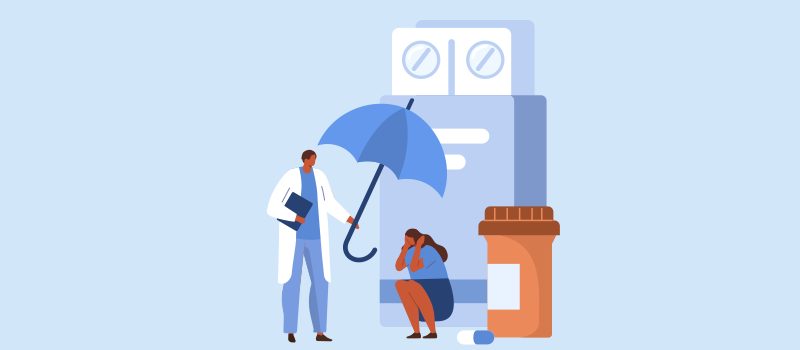
Trazodone is an antidepressant widely used for treating depression and insomnia. Its versatile properties make it suitable for various mental health conditions. Trazodone helps improve new or worsening depression symptoms. Doctors also prescribe trazodone for off-label use as a sleeping pill to treat insomnia, anxiety disorders, pain management, and post-traumatic stress disorder, especially when they are caused by depression. Trazodone can be used in combination therapy with other drugs to treat depression.
Continue reading to learn about the uses of trazodone, including safety considerations, tips on how to take it, and how it compares with other antidepressants.
What is trazodone?
Trazodone is used in the treatment of major depressive disorder (MDD). However, this is not the first-choice drug for depression. It belongs to a drug class called serotonin antagonists and reuptake inhibitors (SARIs). Therefore, trazodone is often classified as an atypical antidepressant because it works differently than the major antidepressant classes like SSRIs (selective serotonin reuptake inhibitors) or SNRIs (serotonin-norepinephrine reuptake inhibitors).
The U.S. Food and Drug Administration (FDA) has approved trazodone for the treatment of major depressive disorder (MDD) or depression. While trazodone is not the first-choice treatment for depression, like SSRIs or SNRIs, trazodone can be beneficial for people who also have anxiety and insomnia due to depression.
While trazodone's precise mechanism of action is not fully understood, it is believed that trazodone has some similar properties to SSRIs. Specifically, trazodone increases the availability of the neurotransmitter serotonin, a natural brain chemical that promotes the sense of general well-being, improves mood and energy, and thus relieves depressive symptoms over time.
Just like any other medication, trazodone may cause side effects. Trazodone is known for its sedative effect, causing drowsiness and sleepiness; however, this is actually beneficial for people who also have sleep problems. Otherwise, it is recommended to take trazodone at bedtime to avoid daytime sleepiness and tiredness. Other side effects of trazodone include dry mouth, dizziness, nausea, blurred vision, and headache.
It is essential to consult your healthcare provider if you start taking any new medications or if you experience any unusual adverse effects.
What is trazodone used for?
Depression is a complex mental illness characterized by persistent feelings of sadness, hopelessness, and a loss of interest or pleasure in activities.
Serotonin is often called the "feel-good" neurotransmitter because it regulates mood, emotions, and feelings of well-being. Trazodone inhibits serotonin reuptake in the brain, increasing the availability of this neurotransmitter. This effect contributes to mood stabilization and relief from depressive symptoms.
Treat Major Depressive Disorder
Trazodone is used as an antidepressant medication when first-line treatment for depressive disorders is reported not to show effectiveness and tolerance in patients.
Trazodone works by balancing the levels of serotonin in the brain. The FDA has approved its use in depression, but due to the sedative effect of trazodone, it is off-label and used to help patients who have trouble sleeping due to depression.
Due to its sedating side effects and with other antidepressant classes (such as SSRIs and SNRIs) having well-studied safety and efficacy profiles, trazodone is not considered the first choice for treating major depressive disorder. Healthcare providers may consider using other medicines like selective serotonin reuptake disorders (SSRI) or serotonin-norepinephrine reuptake inhibitors (SNRI).
Reduce Worsening Depression
In managing depression, trazodone is prescribed when the patient has a sleep disorder. Trazodone has shown significant beneficial effects in alleviating insomnia caused by depression. However, this response can vary from individual to individual. Therefore, you should work closely with your doctor to ensure the best treatment outcomes.
Introducing healthy habits and maintaining a healthful lifestyle can help prevent the worsening of depression. Management of depression is not only limited to the relief of symptoms. An individualized approach for every single patient is necessary for long-term results.
Treat Insomnia
Even though it is primarily an antidepressant, patients are also prescribed trazodone as a sleeping pill to treat insomnia. Trazodone acts as an antagonist at histamine receptors, leading to its sedative properties and effectiveness in managing insomnia.
When using trazodone as a sleep aid, it’s important to follow safety considerations and guidelines.
-
Follow the instructions given by the doctor and read the prescription label carefully about dosing and time of administration of trazodone. Usually, it is taken before bedtime.
-
Monitor and report any side effects experienced by the patient immediately.
-
Do not drink alcohol and avoid driving or operating any heavy machinery, as trazodone induces sleep, making it dangerous for the patient to engage in any activity that requires alertness and concentration.
How does it compare with other medications?
-
Selective Serotonin Reuptake Inhibitors (SSRIs)
Selective serotonin reuptake inhibitors (SSRI) are prescribed for major depressive disorder. However, SSRIs also help with anxiety as the overall mood improves. This class of drugs works by stopping the reuptake of serotonin in the brain, leading to the accumulation of serotonin levels in the brain. Trazodone also works by increasing serotonin levels. SSRIs can be sedative for some people, especially at the beginning of therapy.
-
Tricyclic Antidepressants
Tricyclic antidepressants (TCAs) work by inhibiting the reuptake of serotonin and norepinephrine, leading to increased levels of these neurotransmitters. TCAs have significant side effects, such as drowsiness and weight gain. Therefore, TCAs are not the preferred agents used to treat depression.
Trazodone is considered safer and tolerable for depressive disorders that require sleep induction for the management of the disease.
Other medical uses
Trazodone is primarily used as an antidepressant. It is also used to treat sleep disorders like insomnia. However, it has also been used in other medical conditions like chronic pain, anxiety, panic attacks, and eating disorders like bulimia nervosa (a serious eating disorder in which a patient eats large amounts of food).
Bipolar Disorder
Trazodone is not approved to treat bipolar disorder. This mental health condition is characterized by abnormal and unusual changes in a person’s mood, energy, activities, and concentration. It is important to know that trazodone is not recommended for people with bipolar disorder as this medication can trigger episodes of mania or hypomania.
It is important to let your doctor know if you have bipolar disorder. Your doctor will discuss other treatment options for you. When prescribed to treat depression associated with bipolar disorder, trazodone must be taken in combination with olanzapine.
Anxiety And Panic Attacks
Trazodone has calming effects on patients experiencing anxiety and panic attacks. With the off-label use of this medication, anxiety symptoms are reported to improve.
Other Mental Illness
Trazodone is prescribed off-label for treating other mental illnesses like post-traumatic stress disorder, obsessive-compulsive disorder, and alcohol withdrawal.
What precautions should I take while on trazodone?
Some considerations for the safe and effective use of trazodone are described as follows:
-
Trazodone can pass into breast milk. If you are breastfeeding, tell your doctor before you start taking trazodone. This drug should only be used during pregnancy if absolutely necessary. Risks and benefits must be discussed.
-
To prevent withdrawal and unwanted side effects, you should not change the dosing or discontinue trazodone abruptly.
-
Older patients may be more sensitive to the side effects caused by trazodone. Extra care and monitoring are essential to ensure their well-being.
-
Trazodone increases the intraocular pressure in the eyes. Individuals having issues like glaucoma must use this medication with care. Proper follow-up with the eye specialist is a must.
Drug Interactions
Combining trazodone with certain other medications affects the therapeutic outcomes of Trazodone. Dangerous drug interaction alters the metabolism of Trazodone, resulting in increased or decreased levels of drugs in the body.
Some drug interactions are described as follows:
-
Monoamine oxidase inhibitors like phenelzine, linezolid, methylene blue, selegiline, and tranylcypromine
-
Antifungal drugs like ketoconazole, itraconazole, and some antibiotics, like erythromycin
-
Central nervous system (CNS) drugs such as sedatives, benzodiazepines, and tricyclic antidepressants can worsen the symptoms of depression and sedation, especially in those 65 years and older
-
Medications for migraine headaches such as Imitrex, Maxalt, and Treximet.
-
Anticoagulants or blood thinners such as warfarin (Coumadin).
Your risk of developing a condition called serotonin syndrome may be higher if you are taking any other medicines that affect serotonin levels in your body. If you develop symptoms of serotonin syndrome (anxiety, restlessness, a fast heartbeat, fever, sweating, muscle spasms, twitching, nausea, vomiting, diarrhea, or hallucinations), tell your doctor right away. Medications that can cause serotonin syndrome if combined with trazodone include.
Tell your doctor if you are also using any opioid medication, sleeping pill, muscle relaxer, or other drugs for anxiety or seizures. Give your doctor a complete list of your medications, including prescription drugs, over-the-counter medications, dietary supplements, and herbal products, before starting treatment with trazodone.
Allergic Reactions
Tell your doctor or pharmacist if you have ever had an allergic reaction to Trazodone or any other medications in the past. If you notice symptoms of an allergic reaction, such as skin rashes, breathing problems, facial swelling, and anaphylactic reactions (a life-threatening allergic response that causes a sharp drop in blood pressure and loss of consciousness), call your doctor and seek medical attention at the nearest emergency department immediately.
Dosing
Read the prescription label carefully and take trazodone exactly as prescribed. Trazodone is available in various dosage strengths. It starts at a lower prescribed dose and increases according to the severity of the patient’s illness. Do not make any dose adjustment, including dosing frequency and duration of the treatment, without the approval of your health care professional. The recommended doses for Trazodone are as follows:
-
Tablets: 50 mg, 100 mg, and 150 mg, 300 mg
-
Capsules: 50 mg and 100 mg
-
Liquid solution: 10 or 20 mg for every 1ml
Trazodone is prescribed in different dosage strengths for various medical conditions. To treat depression, the recommended dosage is 150 mg. The doctor may start with a lower dose of 100 mg to minimize the risk of side effects. For treating anxiety, your doctor will typically prescribe 75 mg. A doctor may prescribe up to 300 mg of trazodone for anxiety and more than 300 mg for depression, as needed. Larger doses can be split into doses that can be taken twice daily.
Doses of 300 mg or less are recommended after food and at bedtime, as trazodone induces sleep.
Pre-existing medical conditions
Trazodone must be used cautiously in patients with the following underlying medical conditions:
Liver or kidney disease
Trazodone is metabolized in the liver. Therefore, individuals with impaired liver or kidney may use trazodone with dose adjustments to avoid accumulation in the body.
Irregular heartbeat
Trazodone affects heart rhythm. Patients with cardiovascular problems should use trazodone cautiously, and proper monitoring is required. Call your doctor if you start to notice a fast or irregular heartbeat while taking trazodone.
Blood clotting disorder
Trazodone is safe for patients with a blood clotting disorder. However, it is important to tell your healthcare provider about your condition so he can evaluate the potential risks and benefits of using Trazodone with anticoagulant (blood thinning) medicines. Call your doctor immediately if you have any unusual bleeding while taking trazodone.
In case of a missed dose
If you miss a dose of trazodone, take it as soon as you remember. However, if it is almost time for the next dose, skip the missed dose and go back to your regular dosing schedule. Do not take extra medicine or a double dose to make up for a missed dose. Tell your doctor if you have missed more than one dose.
What to do in case of trazodone overdose or withdrawal
Overdose symptoms
Trazodone must be monitored to avoid overdose in the patient. Call your doctor immediately and visit the poison control center if you experience any of the following overdose symptoms:
-
Difficulty in breathing
-
Extreme sedation
-
Irregular heartbeat
-
Loss of consciousness
-
Seizures
Withdrawal Symptoms
When the patient stops taking trazodone suddenly after using it for a long period, withdrawal symptoms may appear. It’s important to taper trazodone doses slowly according to the dose tapering scheduled by the healthcare professional. Some of the withdrawal symptoms are mentioned as follows:
-
Trouble sleeping
-
Anxiety
-
Inability to make decisions
-
Dizziness
-
Sweating
-
Agitation and anger issues
When tapering off of trazodone, try to incorporate habits like exercising daily, eating a healthy diet, adapting relaxing techniques like meditation to avoid agitation and anger, trying to sleep well to manage insomnia, and engaging in therapy sessions to improve mood swings and anxiety.
Drug misuse
Drug misuse could include taking more than the prescribed dose or taking trazodone without a doctor’s advice. This may lead to very serious life-threatening complications, such as excessive sedation and drowsiness, difficulty concentrating, mood swings, memory problems, impaired liver and kidney functioning, dangerous drug addiction, and serotonin syndrome.
When to call your doctor for medical advice
Seek medical attention from your healthcare provider if you experience any new or worsening symptoms or if you plan to take any other medications or supplements. Seek emergency medical attention if you develop signs of a severe allergic reaction, such as difficulty in breathing, swelling of the face, tongue, or throat, as well as other symptoms, such as rapid heartbeat, extreme drowsiness, and thoughts of self-harm.
Contact your doctor immediately if you have difficulty tapering off trazodone or experience severe withdrawal symptoms.
For a safe and effective treatment plan, it is important to contact the healthcare team to discuss any concerns related to trazodone usage.
References


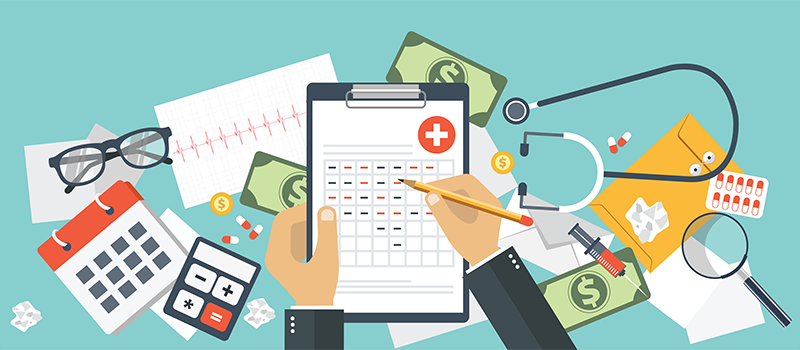
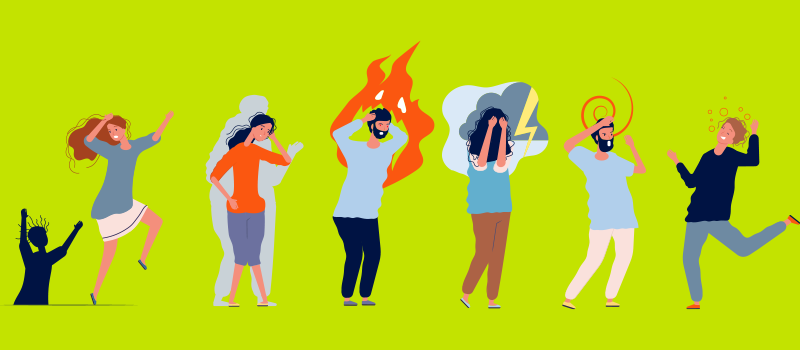

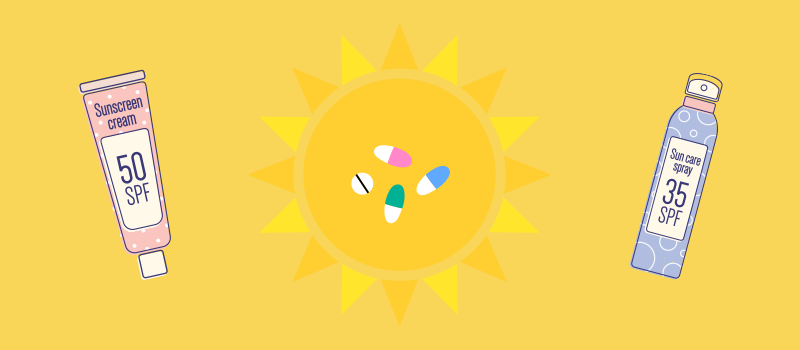
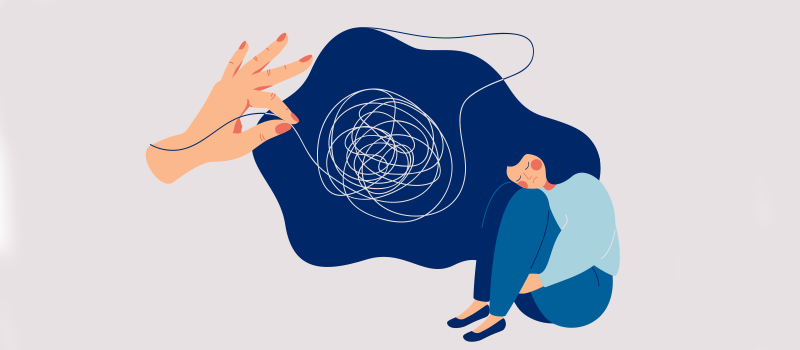
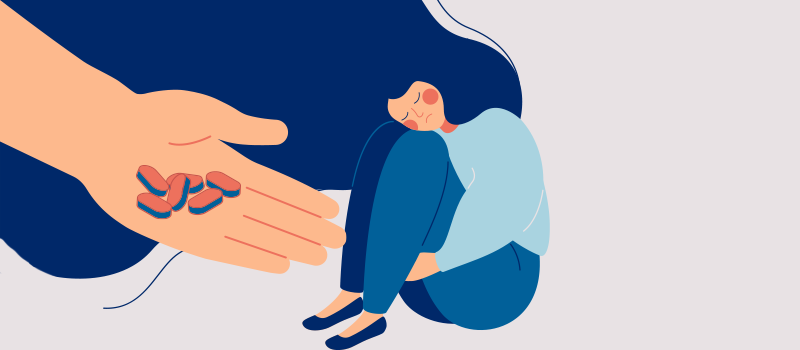




SOCIAL